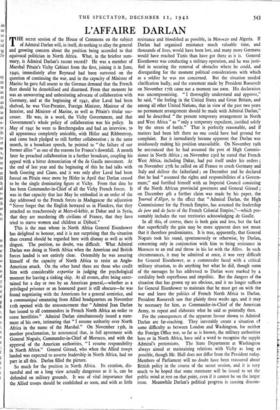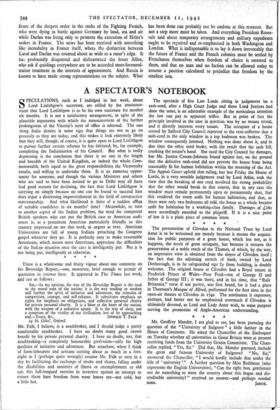L'AFFAIRE DARLAN
THE secret session of the House of Commons on the subject of Admiral Darlan will, in itself, do nothing to allay the general and growing concern about the position being accorded to that equivocal politician in North Africa. What, in the briefest sum- mary, is Admiral Darlan's recent record? He was a member of Marshal Petain's Vichy Cabinet from the first, joining it in June, 1940, immediately after Reynaud had been outvoted on the question of continuing the war, and in the capacity of Minister of Marine he gave full assent to the German demand that the French fleet should be demobilised and disarmed. From that moment he was an unwavering and unhesitating advocate of collaboration with Germany, and at the beginning of 1941, after Laval had been shelved, he was Vice-Premier, Foreign Minister, Minister of the Interior, and Minister of Marine, as well as Petain's titular suc- cessor. He was, in a word, the Vichy Government, and that Government's whole policy of collaboration was his policy. In May of 1941 he went to Berchtesgaden and had an interview, to all appearance completely amicable, with Hitler and Ribbentrop, and came back pledged to still further collaboration ; in the same month, in a broadcast speech, he pointed to "the failure of our former allies " as one of the reasons for France's downfall. A month later he preached collaboration in a further broadcast, coupling his appeal with a bitter denunciation of the de Gaulle movement. At the end of last year and the beginning of this he had talks with both Goering and Ciano, and it was only after Laval had been forced on Petain once more by Hitler in April that Darlan ceased to be the single dominating figure at Vichy. From that date he has been Commander-in-Chief of all the Vichy French forces. It was in that capacity that last May he embodied in an order of the day addressed to the French forces in Madagascar the adjuration "Never forget that the English betrayed us in Flanders, that they attacked us treacherously at Mers-el-kebir, at Dakar and in Syria, that they are murdering die civilians of France, that they have tried to starve women and children at Djibuti."
This is the man whom in North Africa General Eisenhower has delighted to honour, and it is not surprising that the situation thus created should be regarded here with dismay as well as with disgust. The position, no doubt, was difficult. What Admiral Darlan was doing in North Africa when the American and British forces landed is not entirely clear. Ostensibly he was assuring himself of the capacity of North Africa to resist an Anglo- American attack. On the other hand there are those who credit him with considerable expertise in judging the psychological moment for leaving a sinking ship. At all events, after being enter- tained for a day or two by an American general,—whether as a privileged prisoner or an honoured guest is still obscure—he was found negotiating with the Americans for a general armistice, and a communiqué emanating from Allied headquarters on November ith opened with the announcement that "Admiral Jean Darlan has issued to all commanders in French North Africa an order to cease hostilities." Admiral Darlan simultaneously issued a state- ment of his own, intimating that "I assume authority over North Africa in the name of the Marshal." On November r3th, in another proclamation, he announced that, in full agreement with General Nogues, Commander-in-Chief of Morocco, and with the approval of the American authorities, "I resume responsibility in North Africa." General Giraud, who when the Allied troops landed was expected to assume leadership in North Africa, had no part in all this. Darlan filled the picture. So much for the position in North Africa. Its creation, dis- tasteful and on a long view actually dangerous as it is, can be defended on military grounds. It was of vital importance that the Allied troops should be established as soon, and with as little resistance and bloodshed as possible, in Morocco and Algeria. If Darlan had organised resistance much valuable time, and thousands of lives, would have been lost, and many more Germans would have reached Tunis than have got there as it is. General Eisenhower was conducting a military operation, and he was justi- fied in securing the removal of obstacles where he could, and disregarding for the moment political considerations with which as a soldier he was not concerned. But the situation needed clarification badly, and the statement made by President Roosevelt on November r 7th came not a moment too soon. His declaration was uncompromising. "I thoroughly understand and approve," he said, "the feeling in the United States and Great Britain, and among all other United Nations, that in view of the past two years no permanent arrangement should be made with Admiral Darlan," and he described "the present temporary arrangement in North and West Africa" as "only a temporary expedient, justified solely by the stress of battle." That is perfectly reasonable, and if matters had been left there no one could have had ground for complaint. But it immediately became apparent that Darlan was assiduously making his position unassailable. On November t9th he announced that he had assumed the post of High Commis- sioner in North Africa ; on November 23rd he stated that French West Africa, including Dakar, had put itself under his orders ; on November 27th he called on all France to crush Germany and Italy and deliver the fatherland ; on December 2nd he declared that he had "assumed the rights and responsibilities of a Govern- ment," and fortified himself with an Imperial Council consisting of the North African provincial governors and General Giraud ; on December 4th a further claim was made by his paper, the yournal d'Alger, to the effect that "Admiral Darlan, the High Commissioner for th,e French Empire, has assumed the leadership de jure and de facto of the French Colonial Empire,"—which pre- sumably includes the vast territories acknowledging de Gaulle.
In all this, of course, there is both gain and loss, but the fact that superficially the gain may be more apparent does not mean that it therefore predominates. It is true, apparently, that General Nogues took his stand, spontaneously or otherwise, by Darlan, consenting only in conjunction with him to bring resistance in Morocco to an end and throw in his lot with the Allies. In such circumstances, it may be admitted at once, it was very difficult for General Eisenhower, as a commander faced with a critical military situation, to do anything but what he did, though some of the messages he has addressed to Darlan were marked by a cordiality both superfluous and impolitic. But the dangers of the situation that has grown up are obvious, and it no longer suffices for General Eisenhower to maintain that he must get on with the war and leave the politics of French North Africa to Darlan. President Roosevelt saw that plainly three weeks ago, and it may be necessary for him, as Commander-in-Chief of the American Army, to repeat and elaborate what he said so pointedly then.
For the consequences of the apparent favour shown to Admiral Darlan are far-reaching. They inevitably create a situation cf some difficulty as between London and Washington, for neither the Foreign Office nor, so far as is known, the military authorities here or in North Africa, have said a word to recognise the supple Admiral's pretensions. The State Department at Washington always aimed at maintaining relations with Vichy as long as possible, though Mr. Hull does not differ from the President today. Members of Parliament will no doubt have been reassured about British policy in the course of the secret session, and it is very much to be hoped that some statement will be issued to set the public mind at rest on that point, even if it cannot be on the larger issue. Meanwhile Darlan's political progress is causing discom- fiture of the deepest order in the ranks of the Fighting French, who were dying in battle against Germany by land, sea and air while Darlan was living only to promote the execution of Hitler's orders in France. The news has been received with something like incredulity in France itself, where the distinction between Laval and Darlan was counted about as wide as a razor's edge. It has profoundly disquieted and disheartened the lesser Allies, who ask if quislings everywhere are to be accorded most-favoured- traitor treatment in the interests of appeasement. And Russia is known to have made strong representations on the subject. What has been done can probably not be undone at this moment. But not a step more must be taken. And everything President Roose- velt said about temporary arrangements and military expedients ought to be repeated and re-emphasised in both Washington and London. What is indispensable is to lay it down irrevocably that the future of France and the French colonies must be settled by Frenchmen themselves when freedom of choice is restored to them, and that no man and no faction can be allowed today to assume a position calculated to prejudice that freedom by the smallest iota.



























 Previous page
Previous page